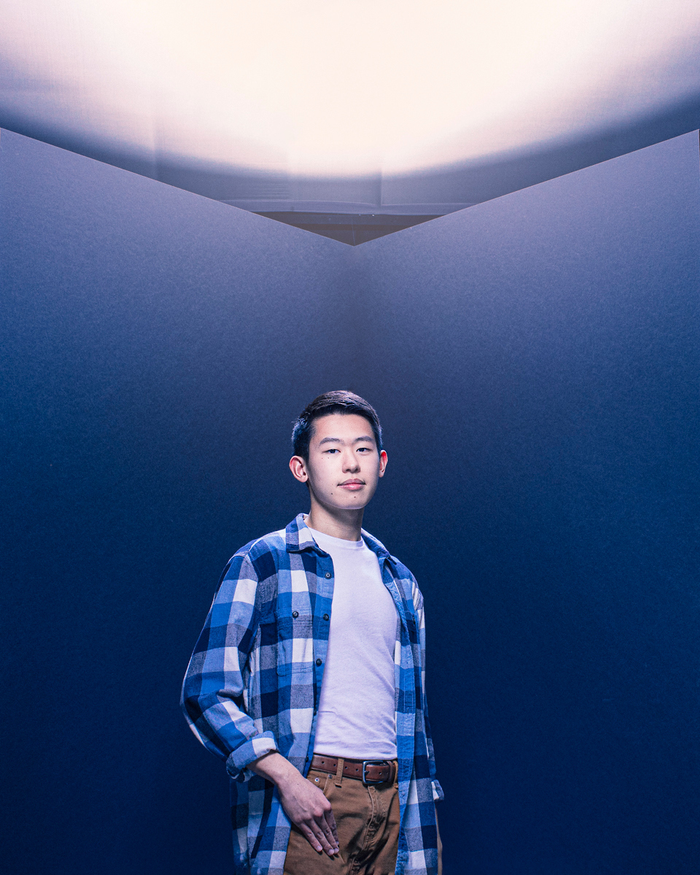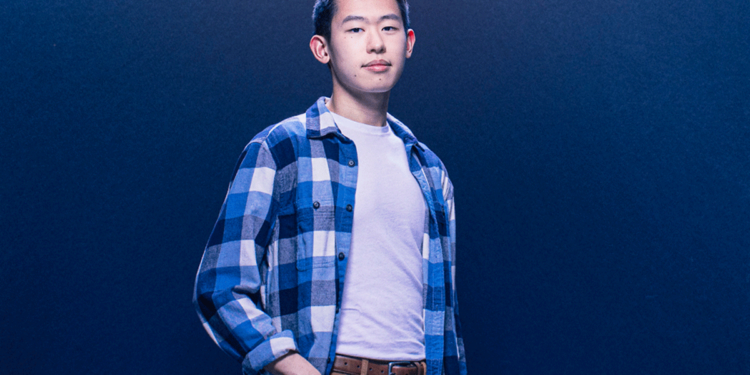Andrew Li ranked third in his senior class at Westside High School when he graduated last spring, scored a perfect 36 on his ACT, and was a National Merit Finalist. Before graduating from high school, he already had “college teacher” on his resume and shown promise in a national competition.
br
Li shared a huge idea with an international audience as one of 15 finalists in the 2020 Breakthrough Junior Challenge, a science video competition. Students age 13 to 18 created original three-minute videos to explain a concept or theory in the life sciences, physics, or mathematics, then were judged on their ability to communicate complex scientific ideas in an engaging manner. Li’s entry was titled “Some Infinities Are Bigger than Other Infinities.”
br
“He was talking about a very high-math concept, and it was something I could relate to,” Westside High School counselor Ted Dondlinger said. “I was impressed.”
br
“It’s so beautifully done, his editorial skill and the choices he made in that presentation,” said Dr. Griff Elder, a University of Nebraska at Omaha professor of mathematics. “I am so impressed with the kids who are able to…not just do the work, but express it so clearly. There’s been a much greater emphasis over the past 20, 30 years in terms of expository writing and communicating mathematical research to the public.”
br
Elder, who hired the 17-year-old Li as a teaching assistant for spring semester 2021, has been acquainted with Li throughout the young man’s journey into higher math. Li began taking college-level coursework at age 12 through UNO’s Early Entry Program in 2016 and was an intern during the summers of 2017 and 2018, working under Dr. Matthew Hale of the cybersecurity lab at UNO, helping with the GenCyber camp and coding on a lab project.
br
“The emphasis in those courses is teaching a canon of material that is fairly standardized, and you are being taught methods and you have to repeat. You are basically being taught recipes,” he said. “But there is a much more creative side of mathematics where the goal is to figure out why and then to explain yourself. There are students who are very young for whom that’s been their habit all along…but if you follow the beaten path you tend not to see theoretical mathematics until you are a junior in college.”
br
Students like Li are apt to find the way to early educational experiences, Elder said.
br
“With Andrew, I suggested he take a course called ‘Introduction to Abstract Math.’ He did that in 2018. There were interesting things he picked up, and the idea for his Breakthrough Junior Challenge was a presentation from that class,” Elder said. “There is something really important from a student’s perspective to be able to take ownership of things. If you can meet the student where they are and engage them on topics they are interested in, the return on investment is huge because the energy comes from the student.”
br
The idea of making complex information accessible appealed to his own learning process, Li said.
br
“I’m a pretty fast learner. That really helps me learn the content, but then allocate the rest of my time to thinking about the material and reflecting on how I would teach it, and that becomes my benchmark for understanding,” he said.
br
Li created his video entry in spring 2020 using programs available to him through his school account.
br
“I didn’t have any experience creating videos like this; there was a lot of editing involved,” Li said. “It was good for me to dip my toes into something I hadn’t done before.”
br
His biggest challenge was creating a succinct script that fit the time limit, Li said, and he consulted with Elder and other math colleagues for feedback. Finding out he was a finalist last fall was a surprise.
br
“I didn’t expect it to make it this far,” he said. “What was really cool was the people who judge this at the finalist level are people that I look up to—‘science idols,’ I would say— mathematicians and physicists.”
br
It’s apparent that Li has a natural inclination for mathematics, among other things, but curiosity leads him to new intellectual adventures, he said.
br
“I see something that I don’t know about, and if it’s in a field I’m really interested in or if it’s something that’s interesting in its own right, it resonates with me: ‘What is this?’ and ‘What can I learn more about this thing?’” he explained. “My interests are pretty broad, so if I see something [I] want to learn more about like biology, psychology, physics, arts, the sciences, I go for it: I start Googling, I start reading Wikipedia, I start searching for articles.”
br
Li, who turns 18 this month, said he’s a typical teen who likes to hang out with friends, who would say Li is knowledgeable but also that, “I’m a little funny, I hope,” he said. “I like to make people laugh.” His peers voted him homecoming king last fall.
br
Li is now beginning his freshman year at the top-tier Massachusetts Institute of Technology to study math and computer science. Post-college, he’s interested in several potential careers and willing to embrace more adventures in the future.
br
“Being a professor or being a teacher is always out there as a very possible career pathway I would take. I’ll probably go into industry for a short while to satisfy that practical side of me,” Li said. “But after that I would love to return to school and maybe get a Ph.D. and do research, and also teach as a big component of that…I do love lifelong learning.”
This article originally appeared in the October 2021 issue of Omaha Magazine. To receive the magazine, click here to subscribe.

Photo by Bill Sitzmann













